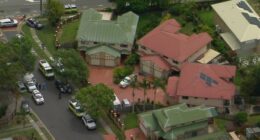Share this @internewscast.com
And as of 11 December this year, social media companies will be required to take “reasonable steps” to prevent Australian children and teenagers under 16 from using their platforms.
Can age assurance be done effectively in Australia?
“These solutions are technically feasible, can be integrated flexibly into existing services, and can support the safety and rights of children online.”

The communications minister will decide which apps are included in the ban. Source: AAP / Joel Carrett
With details about the accuracy of the technologies tested left for later release, experts are wary of the trial’s initial claim.
“This research shows Australians widely support our world-leading age restrictions on social media for under 16s and have strong expectations of platforms when it comes to data protection and security,” Communications Minister Anika Wells said in a statement.
Australians could be ‘in for a rude shock’
“It’s absolutely everything you would expect to find in the midst of a moral panic where people have been sucked along with this idea that, ‘Yeah, this thing is really, really bad and we need to prevent it,’ but have not stopped to think critically about this, and then not been properly informed about the fullness of that risk.”
“So from our perspective, it’s the Trojan horse for getting people to get used to providing more and more credentials online.”
‘A really good start’
“But after having lots of conversations with parents in particular, it became abundantly clear that the ban was making parents have a conversation that we’ve needed to have for a very, very long time.”
“If this is world-leading, we need to be quite clear on what the legislation is actually doing.”

Australia is the first country to try to implement a teen social media ban. Source: AAP / Dean Lewins
He warned that the implementation of the policy may not address all the issues that have been discussed.











